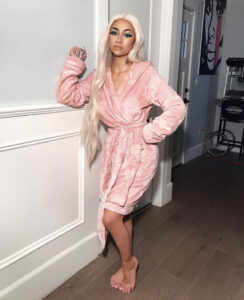
Bhad Bhabie is blackfishing right in front of our faces— and what are we to do about it?
Rapper Danielle Bregoli, who goes by the stage name Bhad Bhabie, rose to fame after her appearance in 2016 on “Dr. Phil.” Her influencer status has been intertwined with her problematic behavior towards the Black community.
Last Monday, Bregoli posted a hardly recognizable video of herself to her Instagram account. In the video, she donned overly plump lips, -courtesy of her lip fillers-, straight black hair, and a foundation that was noticeably darker than her actual skin tone. This video that went viral on social media is not the first time that Bregoli has been accused of blackfishing.
The term blackfishing was coined by Twitter user @WannasWorld to describe the act of a nonblack person cosplaying as a Black person. Blackfishing is a popular topic that is brought up whenever a nonblack person begins adopting traits that are exclusively associated with blackness, such as Kanekalon hair and darker skin tones.
Blackfishing is becoming a trendy notion among influencers and celebrities. Swedish influencer Emma Hallberg was recently exposed for posing as a mixed black woman. According to Buzzfeed News, Hallberg denied that she used any spray tans or self-tanners, however, according to her before and after photos, it is apparent that darker foundation was intentionally used to darken her skin tone.
The black aesthetic that is mocked and replicated by people for capitalization. Meanwhile, there are still black women that face repercussions for these same features.
Blaccents, a term used to describe the particular tone used by a non-black person that imitates African-American vernacular, are commonly used today, whether it is in movies like Crazy Rich Asians or by TikTok users. When a non-black person surfaces a new look that was formerly deemed “ghetto” on a Black person it is a clear example of the tendency of nonblack people being uplifted for something originally inspired by a Black person.
The noticeable characteristics of nonblack women that blackfishes include using a medium brown skin tone for makeup, manipulating their hair to appear as a curly hair texture between 3A and 3C, and adding lip fillers to enhance their lip shape. These identifying traits led to the conversation on what variation of black women are these non-black influencers trying to portray.
Twitter user @Queen_Lizbet mentioned that Bregoli was not exactly trying to look black, yet she was aiming to look racially ambiguous.
In her tweet, @Queen_Lizbet: “Their aim isn’t to look black it’s to look racially ambiguous/mixed. There are no societal benefits to being a black woman, but being mixed/racially ambiguous/black adjacent is gold. Looking black enough to partake in our things while exotic enough to benefit from colorism.”
Following the initial tweet, the user clarified that her tweet was not to be misinterpreted to erase black women, but she was pointing out how the features of black women with lighter complexions are celebrated in society because of their ambiguous nature, which is the goal for Bregoli and those that are blackfishing.
Colorism absolutely plays a role in blackfishing, yet support from other Black people does as well. If you are Black and support Bhad Bhabie’s music career, as well as other influencers and celebrities that have been accused of blackfishing, you may want to reevaluate who you are supporting.